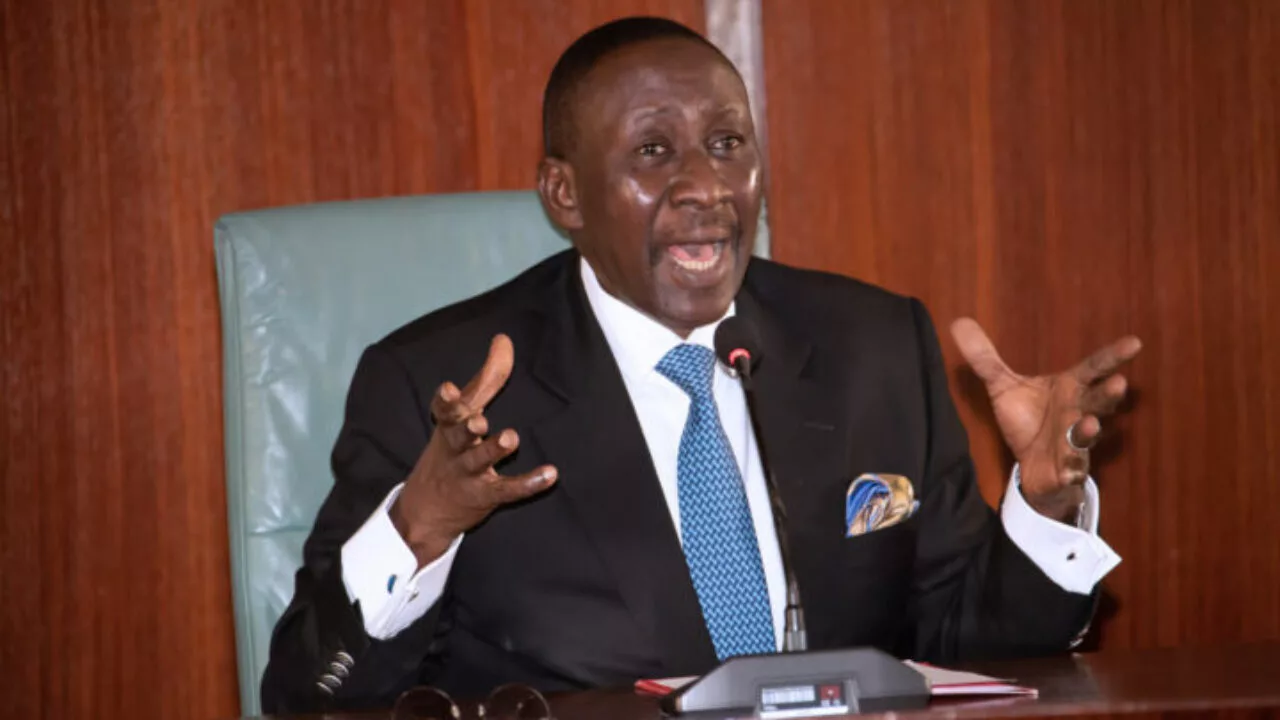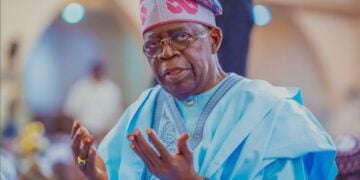Since his appointment by President Muhammadu Buhari as National Security Adviser on July 13, 2015, Maj.-Gen. Babagana Monguno has emphasised and demonstrated a shift in policy and managerial directions for the Office of the National Security Adviser (ONSA). He has refocused the office on formulating policies and strategies which has enhanced adequate coordination of security and intelligence institutions and provided capacity, thereby mainstreaming new processes which support efforts against threats to national security.
2022 was particularly reflective of the NSA’s policy direction on national security and ONSA’s tremendous effort at deploying a multi-sectoral approach to dealing with the security challenges facing the country.
For Monguno, the year started on a pleasant note as the Executive Director of the United Nations Office on Drugs and Crime (UNODC), Ghada Fathi Wali, commended Nigeria following the first-ever successful prosecution of piracy in Africa by Nigeria. The feat was achieved through successful collaboration between Nigeria and UNODC, as evidenced by the Global Maritime Crime Programme and the Strategic Vision for Africa launched in 2021. Interestingly, two key events which led to the success – the promulgation of the Suppression of Piracy and other Maritime Offences (POMO) Act and the Falcon Eye Project – were a result of Monguno’s direct effort.
Between January 31 and February 2, 2022, the NSA, along with his United Kingdom counterpart, Sir Stephen Lovegrove, hosted an inaugural Dialogue in Support of Security and Defence Partnership between Nigeria and the United Kingdom. The event featured defence staff talks and a cross-government forum on human rights. In a communiqué released after the three-day event by the two parties and jointly signed by Monguno and Lovegrove, Nigeria and the UK noted that the two countries enjoy a deep and long-standing security and defence relationship.
As co-chair of the Inter-Agency Consultative Committee on Election Security (ICCES), the NSA, at the first quarterly meeting of the ICCES for the year 2022, tasked the Independent National Electoral Committee (INEC) to address all logistics and operational challenges ahead of the 2023 general elections.
The high success rate that was recorded during the FCT Area Councils election and the off-cycle governorship elections in Ekiti and Osun testified to the groundwork and effort put into electoral security by Monguno, in collaboration with INEC, law enforcement agencies, civil society organisations and other stakeholders.
In support of the president’s determination to deliver successful 2023 General Elections, the NSA further called for synergy, professionalism and patriotism among security agencies at a workshop on election security and management, organised by the Nigeria Police for its officers and men. In his words, “A successfully policed and peaceful election circle is a fundamental variable in the quest by any nation to advance its democracy and deepen its democratic system.”
In March, the NSA chaired the 9th Meeting of the Cybercrime Advisory Council, where he directed additional cybersecurity sensitisation for stakeholders and launched the Cybersecurity Toolkits for MSMEs. Unsurprisingly, after five years of assiduous efforts by the Nigerian Government, Nigeria achieved a milestone in cybersecurity and the fight against cybercrime with its accession to the Budapest Convention on Cybercrime in July 2022 for enhanced international cooperation.
President Buhari signed the Terrorism (Prevention and Prohibition) Bill (2022) into law in May. In Part III of the act, which replaced the Terrorism (Prevention) Act (2011) as amended in 2013, the establishment of, and appointment into, the National Counter-Terrorism Centre is enshrined. The centre is also, by law, domiciled in the Office of the National Security Adviser (ONSA), which is the Coordinating Office for Nigeria’s counter-terrorism efforts.
Since he became the NSA, partnership and cooperation have been at the heart of Monguno’s security strategy, which got him involved in several local, regional and international gatherings on security, defence and intelligence, as well as diplomacy.
In July 2022, following an initial meeting on the margins of the Africa Union Extraordinary Humanitarian Summit and Pledging Conference held in Malabo, Equatorial Guinea, in May 2022, Monguno paid a two-day working visit to the United Nations Office of Counter-Terrorism (UNOCT) at the invitation of the UN Under-Secretary-General (USG), Vladimir Voronkov, for in-person consultations at the United Nations Headquarters in New York.
During the visit, the NSA participated in brainstorming sessions and discussions with Voronkov; the UN Deputy Secretary-General, Amina Mohammed; UNOCT Chief of Human Rights and Gender, Veronic Wright; UN Assistant Secretary-General for Africa, Martha Pobee; UNOCT Deputy to the USG for Counter-Terrorism, Raffi Gregorian; Director of the Counter-Terrorism Centre, Jehangir Khan; the Permanent Representative of Nigeria to the UN, Tijjani Muhammed Bande and other UN officials.
The NSA also represented President Buhari at the High-Level Plenary Meeting to Commemorate and Promote the International Day for the Total Elimination of Nuclear Weapons in New York. At the event, the president, through Monguno, said that Nigeria remained committed to the Nuclear Non-Proliferation Treaty (NPT) and will continue to promote it, but warned that expending further resources on nuclear weapons stockpiling and maintenance made no sense at all.
At the Accra Initiative Summit of Heads of State and Government held in November, the NSA also represented President Buhari, where he called on civil society organisations, non-governmental organisations, bilateral and multilateral development partners and other non-state actors to support their host governments in the fight against terrorism and transnational organised crimes. The summit took note of the will of the Nigerian government to designate representatives to the Multinational Joint Task Force of the Accra Initiative Headquarters in Tamale, Ghana.
Back home, the NSA attended an emergency ICCES security meeting in the wake of incessant attacks on INEC’s facilities, where he made this powerful statement: “Those people who have gangsters working for them, I want to send a very, very clear warning, a categorical and unequivocal warning to each and everyone, regardless of whichever political party, including the party of the President, for as long as you decide to scuttle the electoral process, the law enforcement agencies will equally be uninhibited in reacting to whatever actions you have taken.”
Perhaps the NSA’s most consequential engagement in 2022 was on December 6, when he inaugurated an 11-man Special Investigative Panel on Oil Theft/Losses in Nigeria.
The NSA said at the event that Nigeria was facing a “monumental” loss of revenue and that the recent escalation of illegal activities in the oil and gas sector had led to a significant decline in production.
“Those people serving or retired, who the government has actually reposed confidence in to protect our national assets, who have this perception that being ensconced in the bowel of the state by virtue of their emplacement, can escape the long arm of the law, we must fish them out,” he said during the inauguration.
In the wake of the security advisories issued by the U.S. Embassy in Abuja and other diplomatic missions to their citizens, Monguno led the federal government’s effort to douse the anxiety and tension created by the warnings.
It is understood that most of the security challenges facing the world today are both asymmetric and trans-border in nature, involving mainly non-state actors in different regions and sub-regions of the world. Nigeria and its neighbours are, therefore, not immune to national security threats. Part of the responsibilities of ONSA under NSA Monguno is to develop and maintain intelligence and information-sharing relationships with international, military, domestic and private sector partners to promote intelligence-related communications, standardise processes for collaboration and lead coordination on all issues concerning national security.
Despite notable challenges, NSA Babagana Monguno was steadfast in carrying out his core responsibilities in 2022, and nothing suggests that he won’t continue to do so in 2023, especially as Nigeria approaches another political transition.
Usman wrote from Abuja





